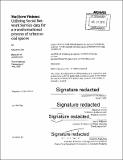Ma(i)cro visions : utilizing social network service data for a transformational process of urban social spaces
Author(s)
Ahn, Chaewon
DownloadFull printable version (42.64Mb)
Alternative title
Utilizing social network service data for a transformational process of urban social spaces
Other Contributors
Massachusetts Institute of Technology. Department of Architecture.
Advisor
Michael Dennis and Sarah Williams.
Terms of use
Metadata
Show full item recordAbstract
The proliferation of data and technological evolution visualizes normally unseen dimensions of human interaction. However in urban studies, only a few embrace this new way of seeing as a practical tool to observe the public realm. This thesis recognizes the digital traces we leave on the web in our everyday life as a new resource to understand the human interaction with the city. The thesis explores reading social space with social network service data and develops a manual for a new way of reading the city that integrates this new layer of information with traditional methods. The research collects Instagram location data which is stored when people tag their post with a location. I read these data points to form a psychological geography comprised of meaningful places that people recognize, share and remember. The thesis is twofold: understanding the behavior of this data and finding ways to use it. The thesis first, maps demographic characteristics, the psychological geography, and the built form, and overlaps them to understand the relationship among people, perception and the built form in Boston. The analysis concludes that qualitative social space reading becomes more limited as the population turns vulnerable and the location density decreases, because the meaningful places for people shift towards commercial and private spaces. This calls for a new reading of social space that combines traditional quantitative city reading process with this new collective perception, which forms the second part of the thesis. The manual studies the spatial character of pathways, areas and buildings that appear pivotal or are completely invisible in the psychological geography. The thesis argues that the human perception of a neighborhood constructed through micro documentations of people's everyday experiences informs urban designers with the spatial character of places that form the local identity.
Description
Thesis: S.M., Massachusetts Institute of Technology, Department of Architecture, 2015. Cataloged from PDF version of thesis. Includes bibliographical references (pages [160]-[161]).
Date issued
2015Department
Massachusetts Institute of Technology. Department of ArchitecturePublisher
Massachusetts Institute of Technology
Keywords
Architecture.